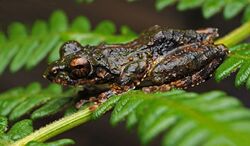Biology:Kurixalus naso
| Kurixalus naso | |
|---|---|

| |
| Scientific classification | |
| Domain: | Eukaryota |
| Kingdom: | Animalia |
| Phylum: | Chordata |
| Class: | Amphibia |
| Order: | Anura |
| Family: | Rhacophoridae |
| Genus: | Kurixalus |
| Species: | K. naso
|
| Binomial name | |
| Kurixalus naso (Annandale, 1912)
| |
| Synonyms[3] | |
|
Rhacophorus naso Annandale, 1912[2] | |
Kurixalus naso, also known as uphill tree frog, long-snouted treefrog, and Annandale's high altitude frog, is a species of frog in the family Rhacophoridae. It is found in northeastern India , southern Tibet, and Bhutan. A related but unnamed species is found in Myanmar and Yunnan (China).[3] Furthermore, it is possible that Kurixalus yangi (Yunnan, Myanmar, and NE India) is a junior synonym of Kurixalus naso.[3][4]
Description
Kurixalus naso is a small frog, growing to about 43 mm (1.7 in) in snout–vent length;[5] Yu and colleagues report lengths up to 33 mm (1.3 in) for males.[6] The snout is noticeably pointed. The limbs have serrated dermal fringes. The chin and breast are granular. Dorsal coloration is generally brownish, mixed with dark markings. The ventral surface is shaded posteriorly with dark spots. The iris is golden. Males have a single, internal vocal sac.[6]
Habitat and conservation
Kurixalus naso is an arboreal species occurring in tropical forest, shrubland and grasslands at elevations of 1,100–1,500 m (3,600–4,900 ft) above sea level. Breeding takes place in small, temporary water pools.[1]
The overall population of Kurixalus naso is believed to be small. It is threatened by deforestation. It is present in two protected areas in northeastern India, Dihang-Dibang Biosphere Reserve and Mouling National Park.[1]
References
- ↑ 1.0 1.1 1.2 IUCN SSC Amphibian Specialist Group (2022). "Kurixalus naso". IUCN Red List of Threatened Species 2022: e.T58959A103870221. https://www.iucnredlist.org/species/58959/103870221. Retrieved 20 December 2022.
- ↑ Annandale, Nelson (1912). "Zoological results of the Abor Expedition, 1911–1912. I. Batrachia" (in English). Records of the Indian Museum 8: 7–36. doi:10.5962/bhl.part.1186. https://www.biodiversitylibrary.org/part/1186.
- ↑ 3.0 3.1 3.2 Frost, Darrel R. (2021). "Kurixalus naso (Annandale, 1912)". Amphibian Species of the World: An Online Reference. Version 6.1. American Museum of Natural History. doi:10.5531/db.vz.0001. https://amphibiansoftheworld.amnh.org/Amphibia/Anura/Rhacophoridae/Rhacophorinae/Kurixalus/Kurixalus-naso.
- ↑ Lalronunga, Samuel; Vanramliana; Lalramliana; Lalhmingliani, Esther (2021). "A new country record of Raorchestes cangyuanensis Wu, Suwannapoom, Xu, Murphy & Che 2019 and additional record of Kurixalus yangi Yu, Hui, Rao & Yang 2018 (Anura: Rhacophoridae: Rhacophorinae) from India". Zootaxa 4974 (2): 383–390. doi:10.11646/zootaxa.4974.2.7.
- ↑ Fei, L. (1999) (in Chinese). Atlas of Amphibians of China. Zhengzhou: Henan Press of Science and Technology. p. 272. ISBN 7-5349-1835-9.
- ↑ 6.0 6.1 Yu, Guohua; Hui, Hong; Rao, Dingqi; Yang, Junxing (2018). "A new species of Kurixalus from western Yunnan, China (Anura, Rhacophoridae)". ZooKeys 770: 211–226. doi:10.3897/zookeys.770.23526.
Wikidata ☰ Q28056226 entry
 |


